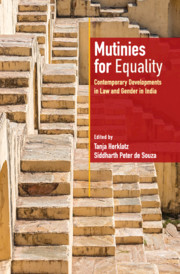3 - Is the Supreme Court Cherry-Picking Its Gender Battles?
Published online by Cambridge University Press: 08 June 2021
Summary
Introduction
In the last decade, the Indian Supreme Court has been seen as nothing less than a shining light on gender equality by leading the path with its progressive judgments. It broadened the interpretation of discrimination on the grounds of ‘sex’ under article 15 of the Constitution to include not just discrimination on the basis of sex, but also on the basis of sexual orientation, gender identity and sex stereotypes.
There have been a whole spate of cases in the last few years decided by the Supreme Court on gender issues. In cases relating to gender identity and transgender rights, the Supreme Court has been extremely forward-looking. In 2014, the Court recognised the right to self-identify one's gender identity as an integral part of the right to life, dignity and autonomy. This was followed by the Puttaswamy judgment in 2017 where the Court held the right to privacy to be a fundamental right and to encompass within its fold reproductive choices, the right to gender identity and the right to have intimate relations without interference from the state. In 2017, the Supreme Court in Independent Thought v. Union of India read down the exception to the criminal law on rape that excluded marital rape unless the wife was 15 years or younger, to hold that sex with or without consent even in cases of married women would constitute rape where the wife was under 18 years.
While these judgments would suggest that the Supreme Court has made great leaps on the issue of gender equality over the last few years, I argue in this chapter that the jurisprudence of the Court has been selectively progressive. The Supreme Court has been selective in its articulation of rights on the grounds of gender and one could ask the question if it is cherry-picking when to expand gender equality. For the purpose of my analysis, I have divided the recent cases in which the Supreme Court has adjudicated on gender equality into three categories. The first category of cases are those where questions of gender equality are either confined to individual petitioners or minority groups, such as sexual and gender minorities, without affecting a larger community. In these cases, the Court has pronounced progressively on gender equality, as there is no threat to the status quo.
- Type
- Chapter
- Information
- Mutinies for EqualityContemporary Developments in Law and Gender in India, pp. 57 - 73Publisher: Cambridge University PressPrint publication year: 2021



